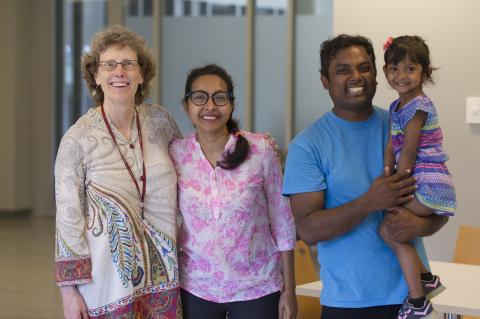
Bringing the World to Our Door
Our international education faculty and alumni also bring the world to us
Mahboob Morshed (Ph.D. 2018) and Sumera Ahsan (Ph.D. 2018) While our international education faculty and alumni spread around the world to help build and strengthen education systems, they also bring the world to us.
While our international education faculty and alumni spread around the world to help build and strengthen education systems, sometimes as a fortunate byproduct, they also bring the world to us.
In 2010, international education professor Cristine Smith traveled to Bangladesh, at the request of UMass College of Education alumna and Bangladesh native, Monica Gomes. Gomes works at BRAC University, in their Institute of Educational Development (IED), where they were in the process of developing masters programs for educational leaders from around the country. She asked Smith to develop and teach a two-week module on adult and child learning theory.
During her two weeks in Bangladesh, Smith met Mahboob Morshed and Sumera Ahsan, IED faculty members who served as her co-instructors, and their relationship with Smith, in part, inspired them to apply to UMass Amherst.
Both were aware of the benefits of pursuing graduate education in the U.S., which in Morshed’s words, is “globally recognized for its quality, rigor and the opportunity for learning with people from diverse cultures.” They were also already familiar with UMass Amherst, as Gomes was their advisor, and Ahsan was inspired by her “critical educational philosophy.” Working with Smith furthered Ahsan’s respect for the College. “I was impressed by their work, critical approaches for analysis, and alternative ideas to address educational issues,” she recalls.
I was impressed by their work, critical approaches for analysis, and alternative ideas to address educational issues
Sumera Ahsan

With the encouragement of colleagues and professors, Ahsan and Morshed applied and were accepted to the doctoral program in international education, beginning in the fall of 2012. In his work, Morshed focused on how Bangladeshi immigrant parents in the U.S. negotiate culture and identity, particularly in relation to their children's education. Ahsan’s graduate work addressed policy and practice of teacher preparation in classroom assessment for secondary school teachers in Bangladesh.
Living and studying in Massachusetts more than met their expectations, giving them far more than a graduate education. “I was fortunate enough to widely travel and learn about the beautiful people and landscape of the U.S., which I cherish,” Morshed notes. They especially enjoyed the the friendships they developed with fellow students from around the world and living in the progressive and multicultural environment. “The time I spent with my friends at UMass and at Amherst is one of the best memories in my life,” Ahsan asserts. “It broadened my ideas and philosophies on life, culture, and globalization.” They also expanded their family while in the U.S., with Ahsan giving birth to their first child.
In a rare turn of events for married graduate students, Morshed and Sumera successfully defended their dissertations in the same week; Morshed on August 13 and Ahsan on August 14, both in the summer of 2018. Within two weeks they turned their dissertations in to the graduate school and went home to Bangladesh.
Ahsan returned to a professorship at the Institute of Education and Research at the University of Dhaka, where she sees the theoretical approaches she studied play out in her work. In particular, she notes that she uses critical sociocultural approaches to policy and practice to explore “underlying issues of education with focus of power and democratic practice in policy making in Bangladesh,” and the actor network theory to understand “the situation of education in Bangladesh as a messy network of human and non-human actors.”
Thanks to his UMass Amherst education, he has been able to bring a “deeper understanding of culture, justice, power, diversity, and equality” to educational development in Bangladesh.”
Mahboob Morshed
Morshed has become an assistant professor at BRAC University, teaching courses on educational leadership and conducting research on education in Bangladesh and South Asian contexts. Thanks to his UMass Amherst education, he has been able to bring a “deeper understanding of culture, justice, power, diversity, and equality” to educational development in Bangladesh.”
Since Ahsan and Morshed’s return, they’ve influenced more students to apply to the College of Education, continuing the pipeline established by Gomes and Smith. The College has experienced a similar phenomenon with students from Afghanistan and Malawi.
These pipelines are proving to be excellent resources for the college. They not only bring talented and engaged students to UMass Amherst, they help the international education program better fulfill its mission to prepare educators from around their world who return to their home countries and become leaders in education.